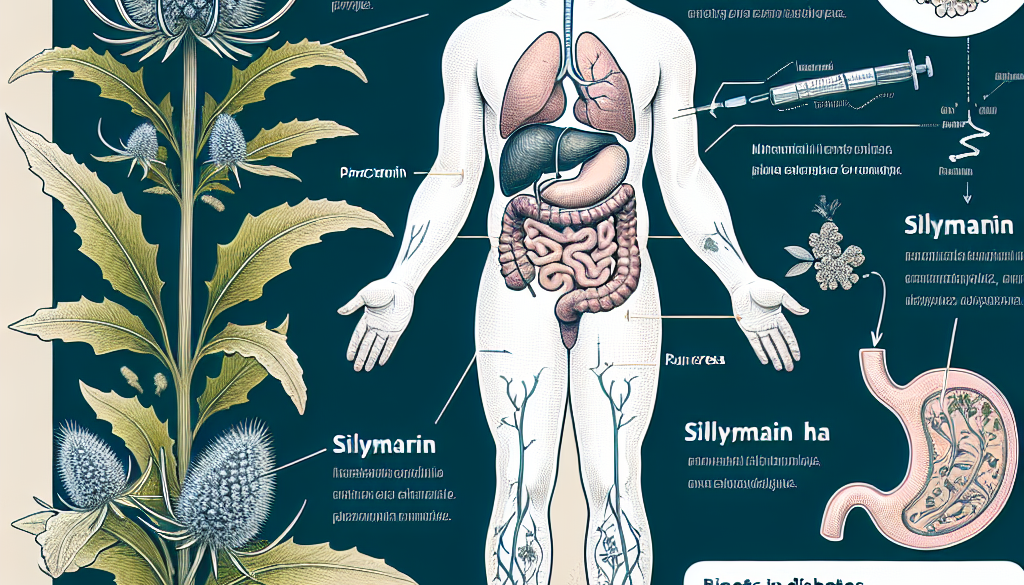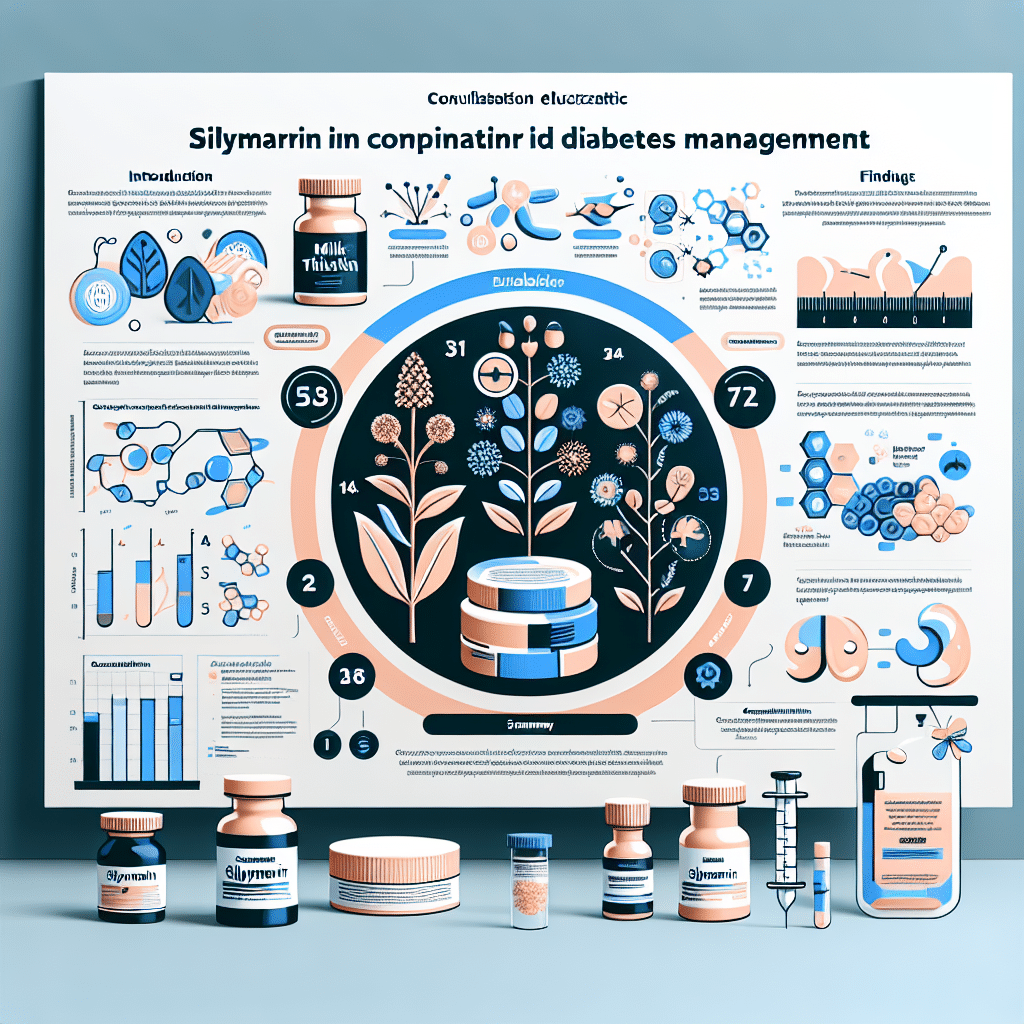Silymarin and Diabetes: Benefits Explained
-
Table of Contents
- Silymarin and Diabetes: Unveiling the Therapeutic Potential
- Understanding Silymarin: Composition and Properties
- The Link Between Silymarin and Diabetes Management
- Antioxidant Effects and Glycemic Control
- Anti-Inflammatory Action
- Insulin Sensitivity and Secretion
- Scientific Evidence: Clinical Trials and Studies
- Case Studies: Real-World Applications
- Statistical Significance: Analyzing the Numbers
- Conclusion: Silymarin as a Complementary Therapy for Diabetes
- Discover ETchem’s Protein Products for Your Health Needs
Silymarin and Diabetes: Unveiling the Therapeutic Potential
Diabetes is a chronic disease that affects millions of people worldwide, posing significant health challenges and increasing the risk of various complications. The search for effective treatments and supplements to manage diabetes has led to the exploration of natural compounds, among which silymarin has shown promising potential. Silymarin, a flavonoid complex extracted from milk thistle seeds, has been traditionally used for its liver-protective effects. However, recent studies suggest that it may also offer benefits for individuals with diabetes. This article delves into the therapeutic properties of silymarin in the context of diabetes management, supported by scientific research and clinical evidence.
Understanding Silymarin: Composition and Properties
Silymarin is a bioactive compound found in the seeds of the milk thistle plant (Silybum marianum). It is composed of several flavonolignans, including silybin, silydianin, and silychristin, with silybin being the most active and abundant component. Silymarin’s antioxidant, anti-inflammatory, and anti-fibrotic properties make it a subject of interest in the treatment of various liver disorders and other health conditions.
The Link Between Silymarin and Diabetes Management
Diabetes is characterized by high blood sugar levels due to the body’s inability to produce or effectively use insulin. Over time, this can lead to damage in various organs, including the liver. Silymarin’s hepatoprotective qualities may indirectly benefit diabetic patients by improving liver function. Moreover, research has begun to uncover direct effects of silymarin on blood glucose control and insulin resistance.
Antioxidant Effects and Glycemic Control
Oxidative stress plays a significant role in the development and progression of diabetes. Silymarin’s strong antioxidant properties help neutralize free radicals, potentially reducing oxidative damage and improving glycemic control. Studies have shown that silymarin supplementation can lead to a decrease in fasting blood glucose levels and improvements in HbA1c, a marker of long-term blood sugar control.
Anti-Inflammatory Action
Chronic inflammation is another contributing factor to insulin resistance and the progression of diabetes. Silymarin’s anti-inflammatory effects may help mitigate this inflammation, thereby improving insulin sensitivity and reducing blood sugar levels.
Insulin Sensitivity and Secretion
Some research suggests that silymarin may enhance insulin sensitivity and promote insulin secretion from the pancreas. This dual action could be particularly beneficial for individuals with type 2 diabetes, who often suffer from insulin resistance.
Scientific Evidence: Clinical Trials and Studies
To substantiate the benefits of silymarin in diabetes management, numerous clinical trials and studies have been conducted. Here are some key findings:
- A study published in the “Journal of Medicinal Food” found that silymarin treatment resulted in significant reductions in fasting blood glucose and HbA1c levels in patients with type 2 diabetes.
- Another study in the “Phytomedicine” journal reported that silymarin supplementation improved insulin resistance and glycemic profile in diabetic patients.
- Research in the “Diabetes, Obesity and Metabolism” journal highlighted that silymarin, combined with conventional treatment, improved liver enzymes and lipid profile in diabetic individuals.
These studies provide a foundation for considering silymarin as a complementary therapy in diabetes management. However, more extensive research is needed to fully understand its mechanisms and long-term effects.
Case Studies: Real-World Applications
Case studies offer insights into the practical applications and outcomes of using silymarin in diabetes care. For instance, a case report detailing the experience of a diabetic patient with nonalcoholic fatty liver disease (NAFLD) showed significant improvement in liver function tests after silymarin treatment. This suggests a potential role for silymarin in managing diabetes-related liver conditions.
Statistical Significance: Analyzing the Numbers
Statistics play a crucial role in evaluating the effectiveness of silymarin in diabetes management. Meta-analyses and systematic reviews have quantified the benefits, indicating that silymarin can lead to meaningful reductions in blood sugar levels and improvements in insulin sensitivity. However, it is important to interpret these statistics in the context of individual health profiles and in consultation with healthcare providers.
Conclusion: Silymarin as a Complementary Therapy for Diabetes
In conclusion, silymarin exhibits potential as a complementary therapy for diabetes, with its antioxidant, anti-inflammatory, and insulin-sensitizing properties. While the evidence is promising, diabetes management should always be approached holistically, considering diet, exercise, medication, and lifestyle changes. Silymarin could be one piece of the puzzle in achieving better health outcomes for those living with diabetes.
Discover ETchem’s Protein Products for Your Health Needs
If you’re looking for high-quality protein products to complement your health regimen, consider ETchem’s offerings. Their range of collagen products, including marine, fish, bovine, and chicken collagen, can support various aspects of health, from joint function to skin vitality. ETchem’s commitment to quality and customer satisfaction makes them a top choice for protein supplements.
About ETChem:
ETChem, a reputable Chinese Collagen factory manufacturer and supplier, is renowned for producing, stocking, exporting, and delivering the highest quality collagens. They include marine collagen, fish collagen, bovine collagen, chicken collagen, type I collagen, type II collagen and type III collagen etc. Their offerings, characterized by a neutral taste, instant solubility attributes, cater to a diverse range of industries. They serve nutraceutical, pharmaceutical, cosmeceutical, veterinary, as well as food and beverage finished product distributors, traders, and manufacturers across Europe, USA, Canada, Australia, Thailand, Japan, Korea, Brazil, and Chile, among others.
ETChem specialization includes exporting and delivering tailor-made collagen powder and finished collagen nutritional supplements. Their extensive product range covers sectors like Food and Beverage, Sports Nutrition, Weight Management, Dietary Supplements, Health and Wellness Products, ensuring comprehensive solutions to meet all your protein needs.
As a trusted company by leading global food and beverage brands and Fortune 500 companies, ETChem reinforces China’s reputation in the global arena. For more information or to sample their products, please contact them and email karen(at)et-chem.com today.





